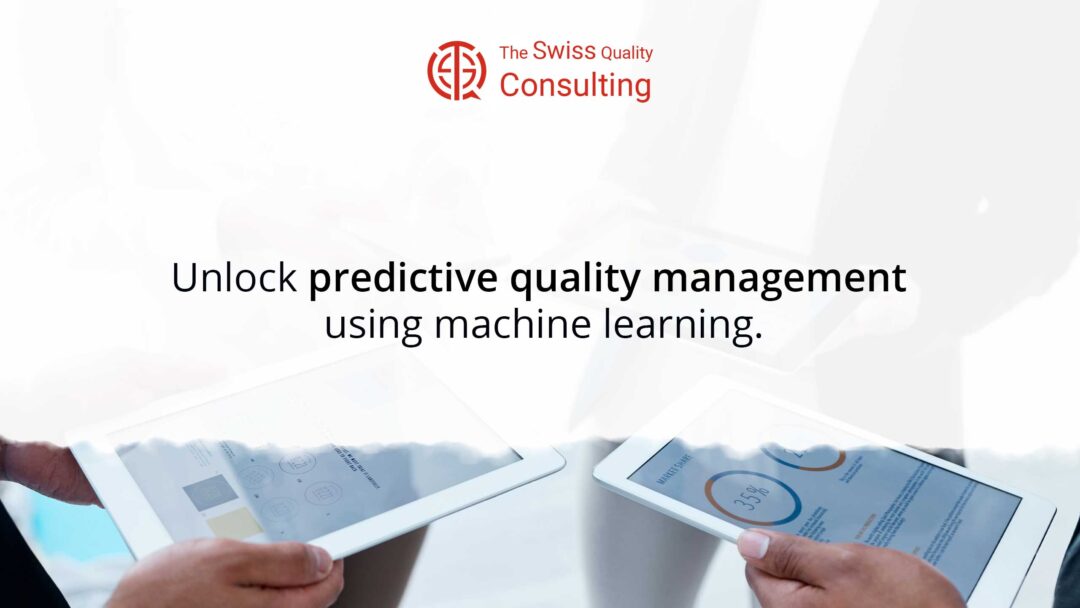Advancing Quality Assurance through Machine Learning Technologies
Unlocking Predictive Quality Management Using Machine Learning is an innovative approach that is reshaping the landscape of quality assurance in various industries. For business executives, mid-level managers, and entrepreneurs, the integration of machine learning into quality management processes represents a significant leap towards efficiency, accuracy, and competitive advantage.
The Revolution of Quality Management with Machine Learning
Traditional quality management, often reliant on retrospective analysis and reactive measures, faces limitations in today’s dynamic and demanding business environment. Machine learning transcends these limitations by introducing a proactive and predictive approach to quality management. This transformative approach harnesses the power of artificial intelligence to analyze vast amounts of data and uncover hidden patterns, enabling businesses to:
1. Predict Quality Issues Proactively: Machine learning algorithms can analyze production data, historical trends, and sensor readings to identify patterns and anomalies that suggest potential quality issues before they occur. This allows businesses to take preventative actions, such as adjusting manufacturing processes, implementing real-time monitoring, or scheduling proactive maintenance, to ensure consistent quality output.
2. Reduce Waste and Improve Efficiency: Early detection of potential issues through machine learning helps to minimize production waste and rework. By addressing problems before they cause large-scale defects, businesses can optimize their production processes, reduce downtime, and improve resource utilization.
3. Enhance Product Quality and Consistency: Predictive quality management enables businesses to ensure consistent and high-quality products that meet customer expectations. By proactively identifying and addressing potential issues, businesses can prevent customer complaints, build brand reputation, and foster customer loyalty.
4. Gain Deeper Insights into Product Performance and Manufacturing Processes: Machine learning facilitates a deeper understanding of the factors that influence product quality and manufacturing processes. This allows businesses to identify areas for improvement, optimize process parameters, and develop data-driven strategies for continuous improvement.
5. Personalize Quality Control Strategies: Machine learning models can be customized to specific products, processes, and manufacturing environments. This allows businesses to develop personalized quality control strategies that are tailored to their unique needs and operational context.
6. Automate Quality Monitoring and Inspection: Machine learning can automate repetitive tasks, such as quality data analysis and defect detection. This frees up valuable time and resources for quality professionals to focus on strategic initiatives and innovation.
7. Foster a Data-Driven Culture of Quality: Predictive quality management encourages a data-driven culture within organizations. This empowers employees to leverage data insights to make informed decisions, improve their work processes, and contribute to the overall quality of products and services.
Beyond Reactive: A Foundation for Sustainable Competitive Advantage:
By prioritizing predictive quality management with machine learning, organizations unlock the true potential of proactive quality control. This strategic approach empowers them to shift from reacting to problems to anticipating and preventing them, leading to reduced waste, improved efficiency, enhanced product quality, and ultimately, a sustainable competitive advantage in a quality-conscious marketplace.
Embrace the power of predictive machine learning and embark on a transformative journey towards a future where quality is not an afterthought, but a cornerstone of your success. By investing in AI technology, fostering a data-driven culture, and empowering your teams to leverage data insights, you can unlock the full potential of your quality management processes and build a future of sustainable success and competitive edge.
Enhancing Decision-Making with Generative AI in Quality Management
Generative AI, a subset of machine learning, further enhances predictive quality management. It can generate new data simulations, providing insights into how changes in processes might affect product quality. This ability helps managers make more informed decisions about quality control and process optimization.
Executive Coaching for AI-Driven Quality Management
Implementing machine learning in quality management requires a specific skill set and mindset. Executive coaching services can be pivotal in preparing leaders for this technological shift. Through coaching, leaders can develop an understanding of machine learning capabilities, strategic thinking for technology adoption, and the leadership skills necessary to drive innovation in quality management.
Communication Strategies in Machine Learning-Driven Environments
Effective communication is crucial in environments where machine learning tools are used for quality management. It involves not only disseminating information about how these tools operate but also explaining the insights they provide in a manner that is understandable and actionable for all stakeholders.
Project Management in the Implementation of Machine Learning Systems
The integration of machine learning into quality management processes is a complex project that requires meticulous planning and execution. Effective project management ensures that the implementation is done within scope, time, and budget, and that the system aligns with the organization’s quality objectives.
Change Management for Technological Adaptation in Quality Assurance
Adopting new technologies like machine learning in quality management often requires significant changes in organizational processes and culture. Effective change management strategies are essential to facilitate a smooth transition, encompassing training staff, managing resistance to new technologies, and aligning new systems with business goals.
Conclusion Unlocking Predictive Quality Management Using Machine Learning
Unlocking predictive quality management using machine learning represents a fundamental shift in how businesses approach product quality and process efficiency. This technology not only enhances the capability to predict and prevent quality issues but also drives continuous improvement and innovation in quality assurance practices.
#PredictiveQualityManagement, #MachineLearning, #QualityAssurance, #AIInnovation, #BusinessStrategy, #TechnologyAdoption






















